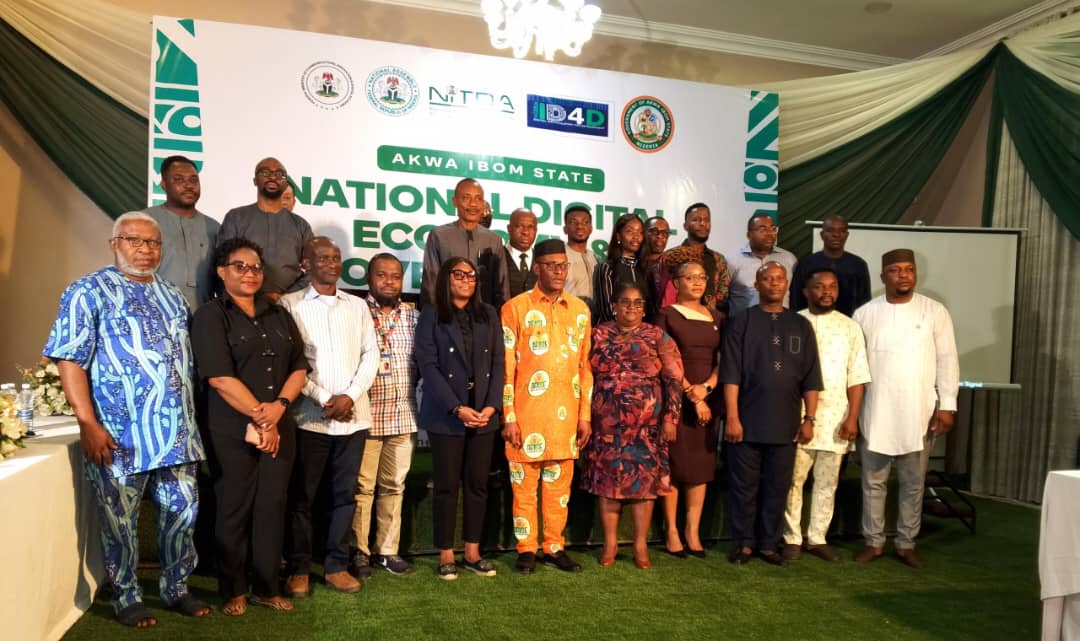FG, Stakeholders Engage on National Digital Economy and E-Governance Bill to Enhance Digital Product Consumption

…Propose National Database Centre to Protect Nigerian Intellectual Property
By Ndifreke Enefiok, Uyo
The Federal Ministry of Communications, Innovation and Digital Economy, National Assembly and stakeholders across the technology space have engaged on the proposed National Digital Economy and E-governance Bill to enhance consumption of digital products by Nigerians.
The engagement, held in Uyo on December 11, 2024 in collaboration with the National Information Technology Development Agency (NITDA), Digital Identification for Development (ID4D), and the Akwa Ibom State Government, forms part of efforts to gather input from across the country to shape the bill.
The National Digital Economy and E-Governance Bill, 2024 is designed to establish a competitive digital economy framework in Nigeria. It aims to promote innovation, support growth, and improve the country’s export-oriented digital capabilities to enhance its balance of trade and services.
Additionally, the bill seeks to strengthen governance by creating a framework for improved digital transformation across Ministries, Departments, and Agencies (MDAs), and facilitating efficient and transparent public service delivery.
Presenting an overview of the bill, Christiana Ossai, representing the consulting firm Duale, Ovia & Alex-Adedipe, highlighted its potential to foster economic growth by enabling citizens to utilise digital services effectively.
The 31-page document outlines provisions on electronic transactions, electronic contracts, consumer protection, digital governance, and offences related to digital operations.
On electronic transactions, the bill stipulates that digital communications cannot be denied legal validity solely because they are in electronic form. Similarly, it mandates that contracts formed via electronic communication retain full legal recognition.
“An electronic communication shall not be denied legal effect, validity, admissibility or enforceability solely on the ground that it is rendered or made available in electronic form.
Where any information is required by law to be in writing, recorded in writing or in printed form, or described as written, notwithstanding anything contained in the law, the requirement or description, shall be satisfied if the information or matter is rendered, recorded, or made available in electronic form, accessible to, and is capable of retention by the intended recipient to be usable or retrievable for a subsequent reference.”
On electronic contracts, the bill stipulates that ‘’where an electronic communication is used in the formation of a contract, that contract shall be denied validity or enforceability on the ground that an electronic communication was used for that purpose.”
For consumer protection, the bill requires service providers to offer accurate and clearly presented information on products and services in a language easily understood by consumers, ensuring transparency and preventing misleading practices.
Other provisions state that a service provider or vendor must ensure its marketing practices and information are current, accurate, not deceptive and misleading to the consumer.
Stakeholders at the engagement noted critical gaps in the bill and proposed additional measures to enhance its effectiveness. Among the recommendations was the establishment of a national database centre to safeguard Nigerian intellectual property.
They also called for the inclusion of a framework to protect creative endeavours such as copyright, trademarks, and quality assurance, which would address legal challenges and foster innovation in the country’s creative economy.
Similarly, stakeholders advocated for the domestication of digital policies to promote local innovation while addressing security challenges, capacity-building initiatives to educate rural communities on digital services and the development of a management framework to ensure clarity and efficient implementation of the bill’s provisions.
The event had in attendance Professor Imoh Moffat, Akwa Ibom State Commissioner for Science and Technology, tech hub founders, academics, policymakers, and digital innovators.







